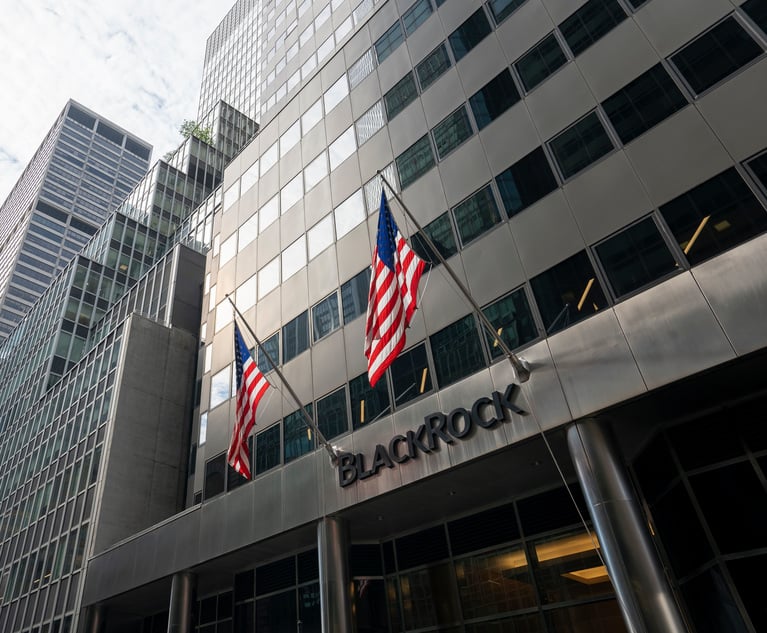'Troubling Trends' in MDL Rulings Require Changes to Evidence Rules, Letter Says
Judges in dozens of rulings in multidistrict litigation have failed to follow Rule 702 in allowing expert testimony into trials that should not have been admissible, wrote three defense lawyers in a Tuesday letter to the Judicial Conference Advisory Committee on Evidence Rules, which is reviewing possible amendments.
June 10, 2020 at 02:07 PM
5 minute read
Judges in dozens of rulings in multidistrict litigation have failed to follow the federal rules of evidence in allowing expert testimony into trials that should not have been admissible, wrote a trio of defense lawyers in a letter Tuesday.
The letter was addressed to the Judicial Conference Advisory Committee on Evidence Rules, which is reviewing a potential amendment to Rule 702, the guidance that federal judges use to determine whether to allow expert witnesses to testify in trials.
Thomas Sheehan and Joshua Glasgow at New York's Phillips Lytle, and their former colleague, Eva Canaan, now at King & Spalding in New York, cited "troubling trends" in 27 opinions on general causation in MDLs during the past eight years, including a recent decision in the talcum powder cases against Johnson & Johnson. Many judges in MDLs involving medical devices, pharmaceuticals or chemical exposure have mischaracterized Rule 702's requirements, according to the letter, or failed to determine whether an expert's methodology was reliable, leaving those questions for juries to decide.
"Judges are not scientists," the letter says. "This impulse to shift responsibility is understandable, but misguided. If federal judges have trouble sorting good science from bad, why would lay juries fare better?"
The advisory committee's next meeting on the proposed amendment is Nov. 13.
The letter mimics some of the arguments from defense lawyers seeking to create the first federal rules over MDLs, such as the inability to file an interlocutory appeal of key rulings potentially having an impact on thousands of cases. The Judicial Conference Advisory Committee on Civil Rules is reviewing those proposals.
Rule 702 was drafted to give effect to the 1993 U.S. Supreme Court decision in Daubert v. Merrell Dow Pharmaceuticals, requiring standards for expert testimony. For the past two years, the Advisory Committee on Evidence Rules has been reviewing whether Rule 702 needs to clarify that the conditions under which federal judges admit expert witnesses should be based on the "preponderance of the evidence," Sheehan said.
"The question the advisory committee is struggling with is whether or not the trial courts are properly applying the rule as written and if not what can they do to clarify the rule to help the trial judges understand their gatekeeping function under rule 702?" said Sheehan, who, along with Canaan, has a Master of Science degree in epidemiology. "What the committee is struggling with, seeing the same decisions we've seen, is what can we do to ensure that trial judges understand that these prongs need to be met, each one independently, and that it is the trial judge's job to ensure that each prong is met independently by a preponderance of the evidence?"
In March, legal officers at 50 U.S. companies filed a separate letter seeking a similar change to Rule 702. And, last month, the Washington Legal Foundation filed its own letter supporting the Rule 702 amendments.
This week's letter proposed an even broader amendment that would ensure any "problems with any of the prongs in Rule 702 are not questions of weight for the jury to decide but rather are questions for admissibility of the judge to decide," Sheehan said.
"What we're saying is the judge can't throw up his hands and say, 'Hey, I don't understand this stuff,' or, 'I'm not equipped to determine whether these prongs are met, and therefore this opinion is going to go to the jury, because I determined it's an issue of weight and not admissibility,'" he said.
In the talcum powder ruling, for instance, U.S. District Judge Freda Wolfson of the District of New Jersey found April 27 that the scientific evidence supported both sides, leaving a "battle of the experts" in future trials. Many lawyers insisted the ruling was the "tipping point" for Johnson & Johnson, which announced last month it would discontinue sales of its talc-based baby powder.
Even in MDL rulings that sided with the defendants, judges left questions about the reliability of scientific experts to juries.
"This reluctance to engage with reliability questions suggests that some courts are not clear about their gatekeeping responsibilities under Rule 702," the letter says.
Having inconsistent approaches to Rule 702 also is contrary to the purpose of MDLs, Sheehan said. He noted the 2018 decision by U.S. District Judge Vince Chhabria of the Northern District of California, who cited cases in the U.S. Court of Appeals for the Ninth Circuit in allowing plaintiffs experts in Roundup cases to testify despite "shaky" evidence.
"MDLs are supposed to provide some sort of uniformity over several circuits," he said. "We don't see that. There's a difference in how the law is applied for purposes of these types of questions. And these are science questions. It's not like the science in one jurisdiction should be different from the science in other jurisdiction."
This content has been archived. It is available through our partners, LexisNexis® and Bloomberg Law.
To view this content, please continue to their sites.
Not a Lexis Subscriber?
Subscribe Now
Not a Bloomberg Law Subscriber?
Subscribe Now
NOT FOR REPRINT
© 2025 ALM Global, LLC, All Rights Reserved. Request academic re-use from www.copyright.com. All other uses, submit a request to [email protected]. For more information visit Asset & Logo Licensing.
You Might Like
View All
Who Got the Work: Gibson Dunn and Wilmer to Defend BlackRock in ESG Antitrust Lawsuit
2 minute read
Improper Removal to Fed. Court Leads to $100K Bill for Blue Cross Blue Shield

US Courts Announce Closures in Observance of Jimmy Carter National Mourning Day
2 minute read
Am Law 200 Firm Steps In to Defend Boston Transportation Company in Trademark Dispute
Law Firms Mentioned
Trending Stories
- 1'Pull Back the Curtain': Ex-NFL Players Seek Discovery in Lawsuit Over League's Disability Plan
- 2Tensions Run High at Final Hearing Before Manhattan Congestion Pricing Takes Effect
- 3Improper Removal to Fed. Court Leads to $100K Bill for Blue Cross Blue Shield
- 4Michael Halpern, Beloved Key West Attorney, Dies at 72
- 5Burr & Forman, Smith Gambrell & Russell Promote More to Partner This Year
Who Got The Work
Michael G. Bongiorno, Andrew Scott Dulberg and Elizabeth E. Driscoll from Wilmer Cutler Pickering Hale and Dorr have stepped in to represent Symbotic Inc., an A.I.-enabled technology platform that focuses on increasing supply chain efficiency, and other defendants in a pending shareholder derivative lawsuit. The case, filed Oct. 2 in Massachusetts District Court by the Brown Law Firm on behalf of Stephen Austen, accuses certain officers and directors of misleading investors in regard to Symbotic's potential for margin growth by failing to disclose that the company was not equipped to timely deploy its systems or manage expenses through project delays. The case, assigned to U.S. District Judge Nathaniel M. Gorton, is 1:24-cv-12522, Austen v. Cohen et al.
Who Got The Work
Edmund Polubinski and Marie Killmond of Davis Polk & Wardwell have entered appearances for data platform software development company MongoDB and other defendants in a pending shareholder derivative lawsuit. The action, filed Oct. 7 in New York Southern District Court by the Brown Law Firm, accuses the company's directors and/or officers of falsely expressing confidence in the company’s restructuring of its sales incentive plan and downplaying the severity of decreases in its upfront commitments. The case is 1:24-cv-07594, Roy v. Ittycheria et al.
Who Got The Work
Amy O. Bruchs and Kurt F. Ellison of Michael Best & Friedrich have entered appearances for Epic Systems Corp. in a pending employment discrimination lawsuit. The suit was filed Sept. 7 in Wisconsin Western District Court by Levine Eisberner LLC and Siri & Glimstad on behalf of a project manager who claims that he was wrongfully terminated after applying for a religious exemption to the defendant's COVID-19 vaccine mandate. The case, assigned to U.S. Magistrate Judge Anita Marie Boor, is 3:24-cv-00630, Secker, Nathan v. Epic Systems Corporation.
Who Got The Work
David X. Sullivan, Thomas J. Finn and Gregory A. Hall from McCarter & English have entered appearances for Sunrun Installation Services in a pending civil rights lawsuit. The complaint was filed Sept. 4 in Connecticut District Court by attorney Robert M. Berke on behalf of former employee George Edward Steins, who was arrested and charged with employing an unregistered home improvement salesperson. The complaint alleges that had Sunrun informed the Connecticut Department of Consumer Protection that the plaintiff's employment had ended in 2017 and that he no longer held Sunrun's home improvement contractor license, he would not have been hit with charges, which were dismissed in May 2024. The case, assigned to U.S. District Judge Jeffrey A. Meyer, is 3:24-cv-01423, Steins v. Sunrun, Inc. et al.
Who Got The Work
Greenberg Traurig shareholder Joshua L. Raskin has entered an appearance for boohoo.com UK Ltd. in a pending patent infringement lawsuit. The suit, filed Sept. 3 in Texas Eastern District Court by Rozier Hardt McDonough on behalf of Alto Dynamics, asserts five patents related to an online shopping platform. The case, assigned to U.S. District Judge Rodney Gilstrap, is 2:24-cv-00719, Alto Dynamics, LLC v. boohoo.com UK Limited.
Featured Firms
Law Offices of Gary Martin Hays & Associates, P.C.
(470) 294-1674
Law Offices of Mark E. Salomone
(857) 444-6468
Smith & Hassler
(713) 739-1250









